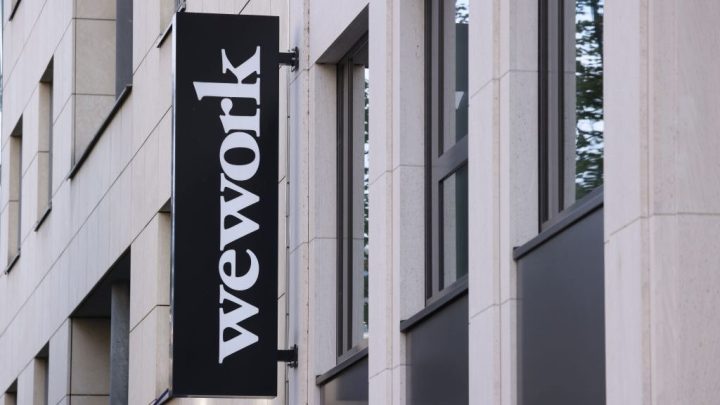
Coworking spaces are trying to put a new lease on the WeWork business model
Coworking spaces are trying to put a new lease on the WeWork business model

Despite WeWork’s high-profile bankruptcy last November, the coworking space industry has managed to soldier on, although many companies are taking a different tack than the industry’s former standard-bearer.
Some, like Mainspace on Long Island, are eschewing traditional offices for unconventional buildings like former churches or warehouses. Others are hoping that coworking spaces near residential areas will attract remote workers. “I think people are looking for convenience and they’re looking for community,” said Amanda Hoover, staff writer at WIRED. “And what better way to get that then walking 5 to 10 minutes to work from somewhere that isn’t home, but it’s pretty close to your home.”
Hoover wrote about the changes afoot in the coworking industry and spoke with “Marketplace” host Kai Ryssdal about her reporting. The following is a transcript of their conversation.
Kai Ryssdal: The headline of this piece is “Local Coworking Spaces Thrive Where WeWork Dared Not to Go.” Where, oh where, did WeWork dare not to go, that these places are thriving?
Amanda Hoover: Yeah, this story was about a couple of kind of unexpected co-working spaces. I personally went to what was formerly a church on Long Island; still looks like a church, you know, big white steeple. The article mentions some other kinds of places like this, like a motorcycle repair garage, some old warehouses. WeWork has done some outfitting of old spaces, but mostly we think of them as a company where they’re renting office spaces in commercial downtowns. And a lot of these places are outside of those commercial downtowns, and they’re in these kind of unconventional buildings now turned into offices.
Ryssdal: The really interesting part about this is, you know, set aside the church and the motorcycle repair shop, they are distinctly suburban. They’re not in, you know, like city centers.
Hoover: Yeah, or not large cities. There’s the company Switchyards; you know, they’re based in mid-to-large-sized cities, but maybe in more residential areas. There’s where they have found a lot of success.
Ryssdal: What’s the theory that says we’re going to put it here, but not where, you know, office workers typically congregate?
Hoover: Yeah, I think people are looking for convenience and they’re looking for community and what better way to get that then walking 5 to 10 minutes to work from somewhere that isn’t home, but it’s pretty close to your home, so you’re kind of surrounded by your neighbors and your community, but getting out of the house and the very claustrophobic nature that working from home can definitely create.
Ryssdal: Well, you know, it’s interesting, right, because work is changing, the places we do work is changing, and in a lot of ways how we work is changing. I was struck, though by the end of your story, literally the last line: “Some parts of office life will ultimately stay in place, no matter where people decide to work from.” We want, not to go back to Starbucks from 15 years ago, we want that third place.
Hoover: Yeah, there’s been so much that’s come out recently about how lonely people are, how lonely Americans are, how lonely workers are. And a lot of people have forged really positive connections that can last for years, you know, based on relationships with their coworkers, but it’s much, much harder to do that if you aren’t forming those bonds that can extend you know, beyond the day-to-day, transactional pieces of work that you do together.
Ryssdal: Which I totally agree with but is that a good foundation for a business model? How are these companies going to do with the OG in this space, WeWork having, you know, spectacularly not done well?
Hoover: Well, WeWork has exited bankruptcy, or they’re in that process, you know, they got their final approval to do so. And they really still view coworking as a viable business. And they’re a much leaner company now. A lot of other companies that are smaller are finding ways to maybe own the space and, you know, not have those leases; are looking into management agreements and revenue-share agreements with landlords, you know, kind of changing some of the riskier pieces of the financial model that came from leasing office space and sub-leasing it out hoping to you know, make a premium from those sub leases. And that was kind of WeWork’s original model. So, we’re definitely in a moment where the future of coworking is being put to a test, and the viability of it.
Ryssdal: You spent a couple hours, or a morning I guess, working out of that converted church. How was it?
Hoover: It was so interesting, because it was kind of like any other modern office in a way. It had a gym. There were people chatting, people heating up their lunch. You are in this beautiful older church, but it’s still, you know, a Thursday at work for people.
There’s a lot happening in the world. Through it all, Marketplace is here for you.
You rely on Marketplace to break down the world’s events and tell you how it affects you in a fact-based, approachable way. We rely on your financial support to keep making that possible.
Your donation today powers the independent journalism that you rely on. For just $5/month, you can help sustain Marketplace so we can keep reporting on the things that matter to you.











